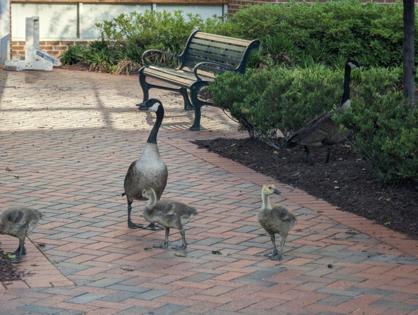Middle schooler finds possible cancer-fighting bacteria -- while looking at goose poop
Published in Health & Fitness
Many researchers can go their entire careers, and sometimes their entire lives, without making a groundbreaking discovery. They might contribute to a body of research, or dive deeper into a topic, but many may not make waves in their fields until much later in their careers, or maybe not at all.
This isn’t the case for Camarria Williams.
The middle schooler is a member of the Boys and Girls Club, and was recruited by the University of Illinois at Chicago to be part of a 14-week science program for young people to learn about scientific careers, according to an Oct. 24 study and Dec. 2 news release from the American Chemical Society (ACS).
Williams and the other students were tasked with bringing in things from their environment to the Chicago Antibiotic Discovery Lab, a research team that works on discovering new sources for antibiotics in the world around us.
Williams’ contribution was goose poop collected from around Garfield Park Lagoon, according to the study, and it was placed on an agar plate (the medium for anything alive in the poop to grow), then under a microscope.
The students “stayed actively involved throughout the scientific discovery process by programming a specialized robot to scoop up bacterial colonies from growth plates and test them for antibiotic activity,” according to ACS.
Inside the goose poop, the researchers found a bacteria from the strain Pseudomonas idahoensis, a group known to have disease-fighting properties, according to a July 10 news release from the Illinois-Indiana Sea Grant, which funds the project.
“We identified some compounds to be cyclic peptides, which are famous for having biologic activity,” program leader and medicinal chemist Brian Murphy said in July. “Amazingly, it turns out these particular compounds don’t have antibiotic activity, but they do have cytotoxic activity — activity against some cancer cell lines.”
The newly discovered bacterium was tested against human melanoma cells and human ovarian cancer cells, and researchers found that the growth of the cancer cells slowed when exposed to the goose-poop bacteria.
There are many steps between the bacteria appearing in goose poop and it becoming a cancer treatment, but Williams can now add “study author” to her list of accomplishments before even starting high school.
“I think the most rewarding part for me is seeing the progress as kids became more confident in themselves over time,” lab researcher Jin Yi Tan said in July. “Like, yeah, I can program stuff. I can do this. I chose these samples.”
The research team includes Williams, Tan, Murphy, Mario Augustinović, Ashraf M. Omar, Vitor B. Lourenzon, Nyssa Krull, Xochitl Lopez, Manead Khin, Gauri Shetye, Duc Nguyen, Mallique Qader, Angela C. Nugent, Enock Mpofu,Jonathon Rodriguez, Joanna E. Burdette, Sanghyun Cho, Scott G. Franzblau, Alessandra S. Eustáquio and Qibin Zhang.
_____
©2024 The Charlotte Observer. Visit at charlotteobserver.com. Distributed by Tribune Content Agency, LLC.










Comments